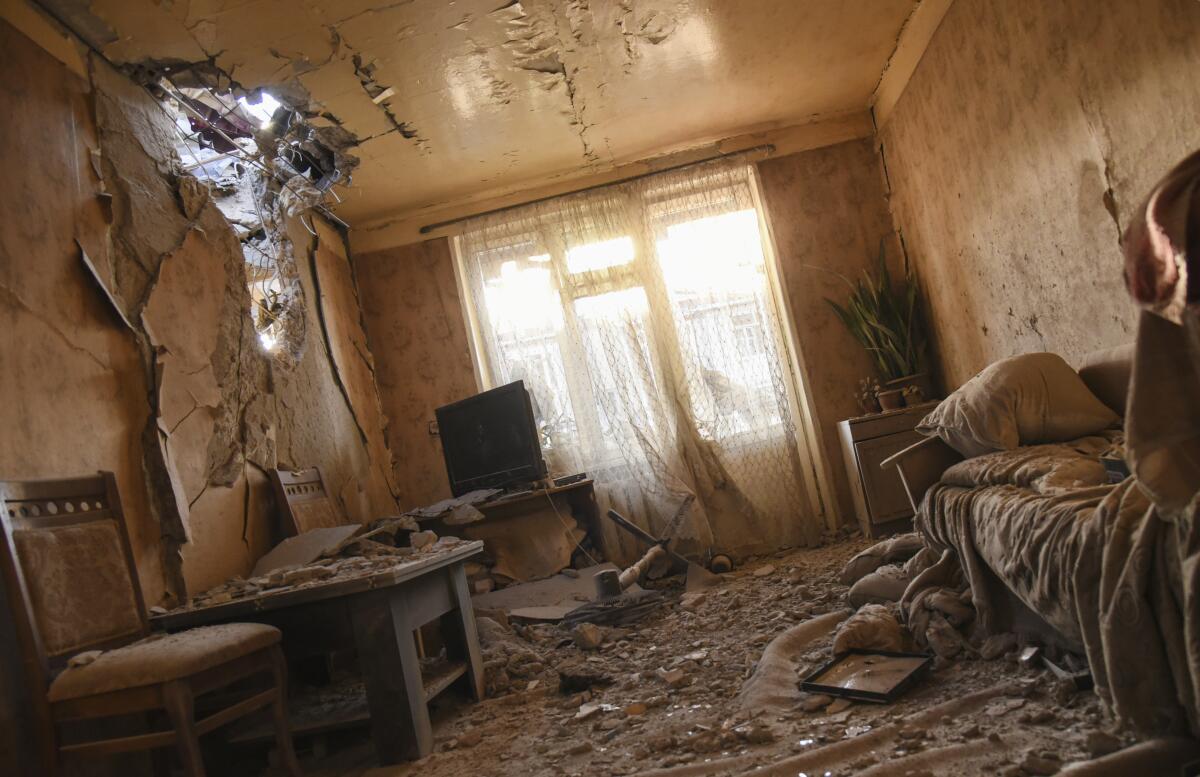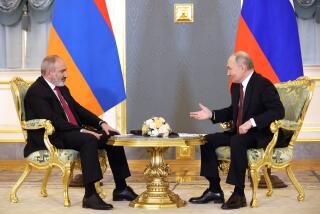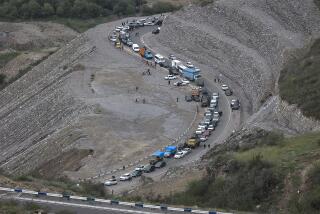Azerbaijan president criticizes mediators as fighting rages on

Heavy fighting between Armenia and Azerbaijan continued Saturday in their conflict over the separatist territory of Nagorno-Karabakh, while Azerbaijan’s president criticized the international mediators who have tried for decades to resolve the dispute.
Fighting that started Sunday is the worst to afflict Nagorno-Karabakh and surrounding areas since the 1994 end of a war that left the region in Azerbaijan under the control of ethnic Armenian local forces backed by Armenia.
Shushan Stepanian, a spokeswoman for the Armenian Defense Ministry, told the Associated Press that “intensive fighting is taking place along the entire front line,” and claimed that Armenian forces had shot down three planes.
Azerbaijan’s defense ministry did not respond to the claim of planes being shot down, but said Armenian forces had shelled civilian territory within Azerbaijan, including the city of Terter.
Nagorno-Karabakh officials have said more than 150 servicemen on their side have been killed so far. Azerbaijani authorities haven’t given details on their military casualties but said 19 civilians have been killed and 55 more wounded.
Nagorno-Karabakh was a designated autonomous region within Azerbaijan during the Soviet era. It claimed independence from Azerbaijan in 1991, about three months before the Soviet Union’s collapse. Full-scale war that broke out in 1992 killed an estimated 30,000 people. By the time it ended in 1994, Armenian forces not only held Nagorno-Karabakh itself but substantial areas outside the territory’s formal borders.
Vahram Poghosyan, a spokesman for Nagorno-Karabakh president’s, claimed Saturday on Facebook that intelligence data showed some 3,000 Azerbaijanis have died in the fighting, but did not give details.
Nagorno-Karabakh was a designated autonomous region within Azerbaijan during the Soviet era. It claimed independence from Azerbaijan in 1991, about three months before the Soviet Union’s collapse. A full-scale war that broke out in 1992 killed an estimated 30,000 people.
By the time the war ended in 1994, Armenian forces not only held Nagorno-Karabakh itself but substantial areas outside the territory’s formal borders, including Madagiz, the village Azerbaijan claimed to have taken Saturday.
Several United Nations Security Council resolutions have called for withdrawal from those areas, which the Armenian forces have disregarded.
Azerbaijani President Ilham Aliyev said in a television interview that the forces must withdraw from those areas before fighting can stop.
In the interview with Al Jazeera, a transcript of which was distributed Saturday by the presidential press office, Aliyev criticized the so-called Minsk Group of the Organization for Security and Cooperation in Europe, which has tried to mediate a resolution of the Nagorno-Karabakh dispute.
One of the reasons behind the current fighting is that “the mediators do not insist or exert pressure to start implementing the resolutions of the United Nations Security Council,” he said.
“We have no time to wait another 30 years. The conflict must be resolved now,” Aliyev said.
Armenia has repeatedly claimed over the last week that Turkey sent Syrian fighters to Azerbaijan and that the Turkish military is aiding Azerbaijan’s.
“Turkey and Azerbaijan are pursuing not only military-political goals,” Armenian Prime Minister Nikol Pashinian said Saturday in an address to his nation. “Their goal is Armenia, their goal is continuation of the genocide of Armenians.”
Beginning in 1915, some 1.2 million Armenians died in a genocide under the Ottoman Empire, which became the modern republic of Turkey.
The Turkish government disputes that a genocide took place.
Azerbaijan’s Foreign Ministry released a statement Saturday alleging that thousands of ethnic Armenians from abroad were being deployed or recruited to fight for Armenia.
“Armenia and Armenian diaspora organizations bear international legal liability for organizing these terrorist activities,” the statement said.
More to Read
Sign up for Essential California
The most important California stories and recommendations in your inbox every morning.
You may occasionally receive promotional content from the Los Angeles Times.






